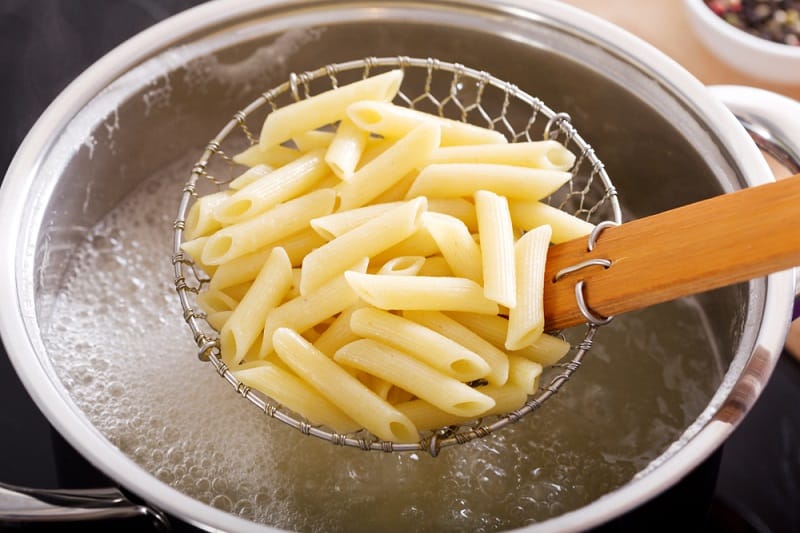
DISCLOSURE: This post may contain affiliate links, meaning when you click the links and make a purchase, I receive a commission. As an Amazon Associate I earn from qualifying purchases.
Pasta Water Substitute
Unless you’re running a professional kitchen, which saves pasta water? Even then, pasta water is more often readily available from a fresh batch than stored away.
If you’re in the middle of a recipe or find yourself needing pasta water and don’t want to go through all the hassle of making fresh, we’ve got a solution.
Here are the four best substitutes for pasta water available.
What Is Pasta Water?
To the uninformed, pasta water may seem pretty useless. However, the high starch content makes it ideal for making gravies and sauces, and it’s an excellent additive for baking bread.
Starchy, leftover pasta water is ever-valuable in the kitchen and a scrap product that you should hold on to from time to time.
High-starch pasta water has a mild, slightly salty taste that is perfect as a base for gravies and sauces.
Pasta sauces made using leftover pasta water are tasty and help coatings and other ingredients cling to the pasta better.
4 Excellent Substitute For Pasta Water
If you don’t have any pasta water handy or don’t like the idea of storing starchy water for later use, we’ve got you covered.
Here’s a look at three excellent substitutes for pasta water, granting a similar consistency and general qualities.
1. Cornflour
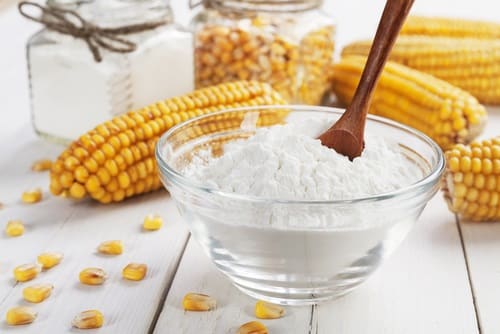
Cornflour is one of the most popular thickening agents because of its natural nature as a thickener and due to the silky texture.
The smooth, silky non-viscous liquid with little to no taste produced by blending the cornflour, salt, oil, and water makes it an ideal replacement for the cloudy, thick consistency of pasta water.
Substituting a cornflour base for pasta water is also ideal for anyone dealing with gluten intolerance.
If you have celiac disease or exhibit gluten sensitivity and mild allergic reactions, opt for cornflour.
[amazon box=”B07X2TRGM7″]
It’s a starch, not a flour which means that all the gluten-forming protein has been stripped away by oxidation during processes.
Highly affordable, supremely versatile, and inexpensive, cornflour is the go-to substitute for pasta water in most situations.
Corn flour is more gelatinous than pasta water once it has been cooked for a while. Work sparingly with the cornflour, using as little as possible.
Never mix this starch with hot water or directly with the blend in your pot or pan once heated, or lumps will form, and keep in mind that your sauce will solidify and become jelly-like once cold.
2. Potato starch
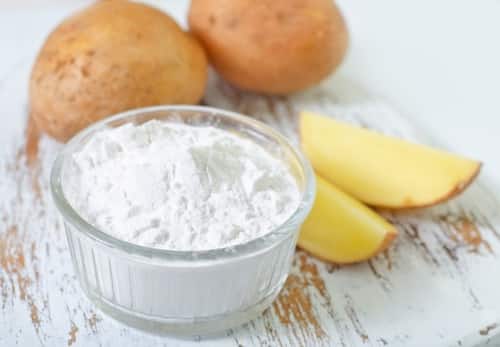
The second-best substitute for pasta water is a mix of potato starch and water. Gluten-free cooks will already have this one in their pantry, but many various types of potato starch are available.
You’re free to use whichever you prefer, regardless of whether it’s dairy-free, grain-free, or soy-free.
If you or a loved one displays gluten sensitivity, this is another safe option. Potato starch has a very neutral taste, and when cooked properly, it develops a texture that’s almost identical to pasta water.
The trick to working with potato starch is to use it sparingly while cooking your mix at low heat.
High temperatures will cause the find in any superstore because it is commonly used for various recipes and can be a good replacement.
3. Cornstarch
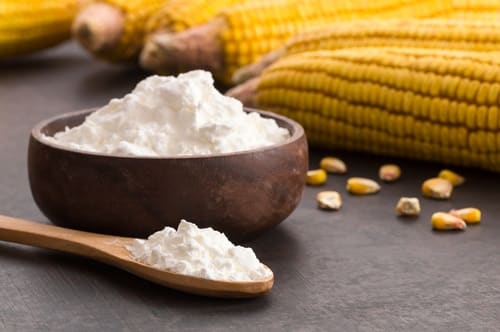
Cornstarch has double the thickening power of cornflour. It’s pure, powerful gluten-free starch.
Never add cornstarch directly to your recipe or warm liquid, or it will form lumps instead of a smooth, silky sauce or gravy.
It only takes a tablespoon or two of cornstarch mixed with a little water to do the same job as pasta water.
After mixing cornstarch and cold water, add in hot water from your pot one tablespoon at a time while mixing well.
[amazon box=”B005PZLFPE”]
When your thickener is warm, runny, and viscous, you can add it to any existing sauce, stew, or gravy mix.
Keep in mind that cornstarch is a much blander replacement for pasta water than the other alternatives listed.
Add a little salt, seasonings of your liking, and perhaps a touch of sugar because all of the sweetness of the corn is lost.
4. Xanthan gum
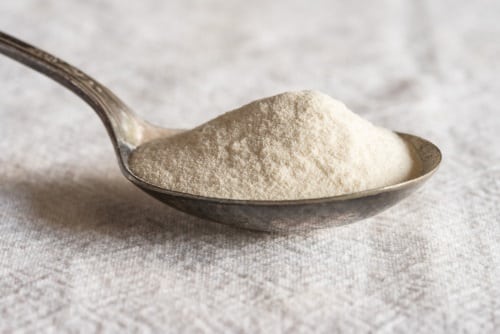
Xanthan gum is a powerful thickener. You’ll need no more than ⅛ teaspoon per cup of liquid that you’re thickening.
It thickens almost immediately and doesn’t need any heating or cooling to spur the process. Stir in and watch as your blend thickens before your eyes.
If you’re adding xanthan gum to a sauce, we recommend that you mix it with a little oil first before stirring it into your food.
5. Arrowroot
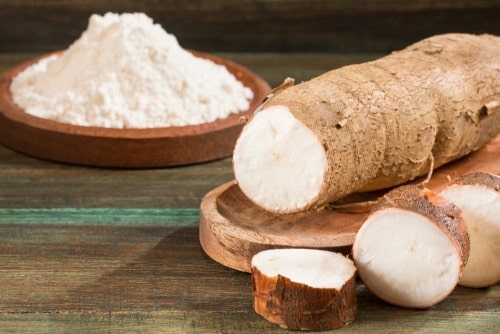
Arrowroot is another great thickener that works very similar to xanthan gum. Combine four to five teaspoons of arrowroot powder with about three tablespoons of water to create a slushy paste.
Add this to a cup of hot stock, stew, or sauce to thicken within minutes. Unlike xanthan gum, arrowroot needs a little cooking to thicken.
Alternatives For Pasta Water When You’ve Got Nothing Else
Rather than opting for our last resort, we suggest that you either boil up two or three tablespoons worth of pasta in a pot with the lid on to speed things up.
You will discard the pasta anyway, so cooking covered grants quicker starch water. You can also boil up some in a covered dish in the microwave if you don’t have a stovetop pot handy.
- Boiled potato
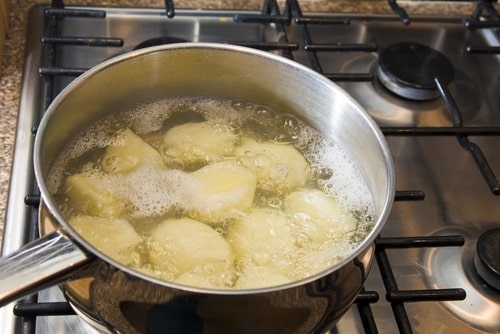
Another fantastic thickener is a potato boiled soft. Cut up a single potato into thin slices as you would for mashed potato and then boil them until they are so soft that they start falling apart.
Drain and discard the water, mash up the potato, and add it to your sauce or stock as a thickener. It’ll take about five minutes of cooking with constant stirring to thicken up.
- Flour and water (the final alternative)

As a final option, mix a tablespoon of flour with a little cold water.
Add in warm stock or water one tablespoon at a time until well blended, and then pour this into your sauce, gravy, or anything you want to thicken.
Uncooked flour causes digestion issues, so make sure that you simmer your food for at least another five minutes after adding it to your pot.
Always Measure Your Starches
No matter which starch you opt for, a little goes a long way. Most starches are powerful thickeners.
Hopefully, reading this blog helped you find the best pasta water substitute for your needs. Enjoy cooking!
Had some potato water saved during this week to make a gravy…did not happen although I am making Oven baked Mac Cheese today…thought the potato water could be utilized instead of fresh water & salt for my pasta nd would flavor pasta…your thoughts…